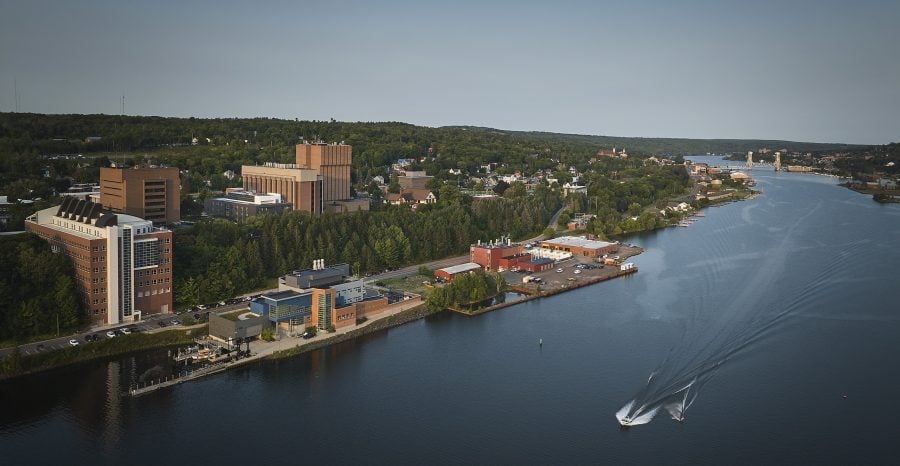
The foresight to envision the rapid rise of everything computational and establish a hub for pioneering and expanding groundbreaking work in the field set Michigan Tech’s Institute of Computing and Cybersystems on its path 10 years ago. An ambitious goal to become “a $10-million institute” was set and has now nearly been met.
ICC Origins and Development
Long before the College of Computing was established, the Institute of Computing and Cybersystems (ICC) was sparking campus conversations centered on research and collaboration. Building on the momentum of the former Alliance for Computing, Information, and Automation (ACIA), which first pushed computing into the spotlight at Michigan Tech, ICC became the University’s first formal step toward uniting and elevating computing research.
The ICC launched as a research institute on July 1, 2015; then-Department of Computer Science faculty member Min Song was named the inaugural director. Song served for a brief time before Tim Havens, then a faculty member in the Electrical and Computing Engineering and Computer Science Departments, took the helm.
“From the start, my vision was building ICC into what I always called a $10 million institute bringing in $10 million a year in awards,” said Havens, who is currently ICC’s executive director.
He said faculty interest and trust were the most significant early hurdles.
“The challenge with starting any organization is really buy-in,” Havens said.
“Research institutes live and die by the research that faculty choose to do within the institute. If faculty don’t feel served, they’ll go elsewhere and the institute dies.”
– Tim Havens, executive director, ICC
Ten years later, ICC has firmly established Michigan Tech as a catalyst for interdisciplinary innovation and research breakthroughs in computing, spearheading initiatives that advance collaborations, secure funding, and raise the University’s research profile in this field.
Tracking a Decade of Growth
In its first year, the ICC exceeded all initial goals. The student support goal was 15 students, and the ICC supported 32. Research output was targeted at 100 publications—faculty members produced more than 150. The first-year plan included four workshops or conferences; however, faculty and staff teamed up to successfully host seven.
ICC’s trajectory was clear from the outset, with rapid membership growth highlighting its pivotal role in advancing computing research at Michigan Tech.
ICC’s Evolution Continues
Adaptation characterizes the ICC. The institute has evolved, now comprising seven specialized centers that demonstrate its broad and developing leadership across computing:
- Artificial Intelligence
- Biocomputing and Digital Health
- Cybersecurity
- Computing Education
- Human-Centered Computing
- Cyber-Physical Systems
- Scalable Architectures and Systems

Some of these fields didn’t exist, at least not in their current form, a decade ago. As technology evolves, the ICC has continually adapted to stay at the forefront of discovery.
Artificial Intelligence is a good example. “AI is almost a fad now, but for good reason. It’s powerful, changing society, and transforming everything,” said Havens.
Beyond creating new centers to address emerging research fields better, ICC leadership has focused on sustainability by diversifying funding sources, building interdisciplinary research teams, and investing in student development to ensure a robust talent pipeline. Together, ICC’s centers create a network of expertise with a broad reach that underscores the College of Computing and Michigan Tech’s overall mission.
Highlighting Major Achievements
The ICC drives groundbreaking research and transformative computing education, extending the College of Computing and Michigan Tech’s impact well beyond campus. Faculty and students tackle critical challenges spanning cybersecurity to lunar exploration.
By year 10, ICC faculty and researchers had secured over $30 million in external research funding—$8.5M in the 2025 fiscal year alone. The Institute was critical to Michigan Tech’s national recognition from the National Center of Academic Excellence in Cyber Defense (CAE-CD) and the National Center of Academic Excellence in Cyber Research (CAE-R). Tech is the only university in Michigan to hold both distinctions.
Havens said that ICC’s accomplishments stem from the people behind the research. The William and Gloria Jackson Professor of Computer Systems in the College of Computing, Havens, who also serves as executive director of the Great Lakes Research Center, exemplifies ICC’s collaborative spirit. His research in machine learning and sensor fusion, applied to fields from national defense to environmental monitoring, reflects the institute’s interdisciplinary strength and impact.
“Of the last 10 years, the ICC is certainly the achievement I’m most proud of. We’re a very collaborative, very positive organization, and I look forward to seeing where it goes next.”
– Tim Havens, Executive Director, ICC
Establishing Impactful Industry Partnerships
The ICC works closely with federal agencies and the private sector. Collaborations include projects with:
- Google (via computer science faculty)
- Adobe (through connections with alumni and PhD graduates)
- Ford Motor Company (long-standing collaborations with ICC members)
- Department of Defense (through SBIR and STTR programs)
Havens emphasized that partnerships depend on more than proposals. “It’s not about the proposal, it’s about the relationship. Gaining trust, meeting face to face, understanding problems, and helping solve them,” he said.
To measure real-world impact, ICC monitors more than funding totals and rankings. Success is reflected in technology transfer (patents, startups, and licenses), societal benefits (such as cybersecurity protections and medical applications), and student outcomes (graduate placements and experiential learning opportunities). Industry feedback also plays an essential role in ensuring ICC’s work addresses real-world needs.
ICC’s Road Ahead
As ICC celebrates a decade of achievement, reflecting on its evolution from a small initiative into one of Michigan Tech’s most influential research institutes, it’s setting the stage for future growth. Events, including the annual Computing[MTU] Showcase, set for Oct. 1-3 this year, will continue to feature research and connect students and faculty with industry partners.
For new partners, engagement with ICC generally begins with a conversation to align goals with faculty expertise, followed by pilot projects or sponsored research agreements. Partners are then invited to participate in workshops, events, and showcases to deepen collaboration.
With new research centers such as the Center for Artificial Intelligence and the new affiliations with CIRCT (the Center for Interdisciplinary Research in Culture and Technology) and the Elizabeth and Richard Henes Center for Quantum Processing, the ICC continues to lead in emerging areas of research. Upcoming initiatives include launching quantum computing research programs, developing AI-powered applications, and initiating interdisciplinary cultural-technological studies. As Havens notes, computing today is “one of the most transformational forces on the planet.”
Over the past decade, ICC has grown from 25 to over 100 members, more than half from outside the College of Computing. The growth and diversity of ICC’s membership illustrate the unifying role of computing at the University. New members are always welcome.
Through sustained partnerships, strong student development, and adaptive research, the ICC is well-positioned for the next decade. As computing continues to reshape industries, society, and daily life, the Institute will remain central to discovery, collaboration, and innovation.
Havens sees both opportunity and inevitability: “Computing is not going to slow down. It’s not going away. Michigan Tech is at the forefront of that change, and our researchers are leading it.”
About the College of Computing
The Michigan Tech College of Computing, established in 2019, is the first academic unit in Michigan dedicated solely to computing, and one of only a handful such academic units in the United States. The college is composed of two academic departments. The Computer Science department offers four bachelor of science programs in computer science, cybersecurity, data science, and software engineering; four master of science programs in applied computer science, computer science, cybersecurity, and data science; and a doctoral program in computer science. The Applied Computing department offers four bachelor of science programs in cybersecurity, electrical engineering technology, information technology, and mechatronics; two master of science programs in health informatics and mechatronics; and a doctoral program is in computational science and engineering.
Questions? Contact us at computing@mtu.edu. Follow the College of Computing on Facebook, Instagram, LinkedIn and Twitter.